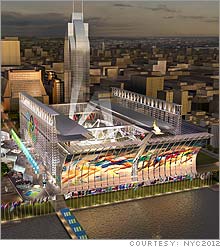 |
| New York's proposed Olympic stadium has sparked a $7.6 million opposition campaign from the owner of the Knicks and Rangers. |
|
|
|
|
|
NEW YORK (CNN/Money) -
New York City's efforts to land the 2012 Olympics have produced one of those only-in-New-York spectacles for the city's residents.
I'm not talking about the parties filled with famous entertainers and athletes -- complete with fireworks displays over Central Park -- that greeted International Olympic Committee representatives this week as they toured the city to consider its bid.
No, I'm talking about the unique experience of seeing the owner of two professional sports teams become the leading sponsor of a campaign against the public financing of a sports venue.
Madison Square Garden LP, which owns the Knicks, Rangers and Liberty, spent about $7.6 million last year lobbying to block the construction of a $1.4 billion Olympic stadium that's been proposed for Manhattan's West Side. The group argues that there are much better uses for the land and tax money it would take to erect the stadium.
The stadium would also be a new home for the New York Jets, who would contribute $800 million for its construction.
The city's Olympic backers have made the stadium the centerpiece of their bid. In fact, they have stated repeatedly that in order for New York to win the host city competition, ground must be broken on the stadium before the IOC votes in July. A bidder imposing that kind of condition on its own bid is almost as rare as, well, a sports team lobbying against public finance of a stadium.
Most bidding cities don't even think about building about new stadiums until they win hosting rights. But by tying their own hands so publicly, New York's organizers hope to link the popular Olympic bid with the more controversial stadium plan. If you support the former, goes this logic, you must also back the latter.
Madison Square Garden, which is owned by Cablevision (Research), has wisely focused its arguments on the stadium's traffic impacts on its proposed West Side neighborhood, and on the city's difficult financial picture. But that's a bit of a ruse, too.
This is clearly a battle to maintain the Garden's position as the premier event space in Manhattan.
"This stadium would cut right into the heart of Madison Square Garden's business model," said Mark Rosentraub, dean and professor of urban affairs at Cleveland State University and an expert in stadium finance and construction. "It'll have the flexibility to hold events of 20 to 25,000 people. That's what the Garden is worried about."
Officials from the Garden and Cablevision won't comment, other than to say they do support the Olympic bid, just not the stadium. Community groups say they don't mind that their benefactor's motives might be its own bottom line.
"We've had many strange bedfellows in this community before," said Joe Restuccia, a neighbor of the stadium site and executive director of a not-for-profit developer of affordable housing. "But you never have had such a high-stakes issue before."
Restuccia and other opponents argue that an Olympic stadium should be built at less costly sites, such as Queens. But the city administration has dismissed those suggestions, saying it needs to be in Manhattan to work financially.
Ultimately, though, the decision on the stadium will have little to do with whether New York gets the Games.
Robert Livingstone, an expert on the Olympic selection process and producer of GamesBids.com, said it is unusual at best for a city not to propose an alternative for a stadium not yet constructed, let alone for its leaders to be saying that construction had to start for an Olympic bid to have a chance.
"I haven't seen anyone else talking about having to get a shovel in the ground," he said. "Normally they'll start building it a year or two out from the vote. The plans for the stadium are important, but the organizers are making more of it than they need to because of their interest in getting the stadium built."
Livingstone said that he'd be surprised if the debate and the stadium itself are determining factors when the full IOC votes on the 2012 games in July. Technical issues, such as this one, are often ignored due to political motivations.
Working most in New York's favor is the fact that the other four candidate cities, Paris, London, Madrid and Moscow, are all in Europe.
As ballots are taken and the lowest vote getter is dropped from each successive ballot, New York could pick up the support of those who find themselves without their first choice, Livingstone said, because each losing city would want to keep their chances for 2016 by keeping the Olympics out of Europe in 2012.
All of which could render a serious debate over the wisdom of the stadium an amusing spectator sport, but little more.

|